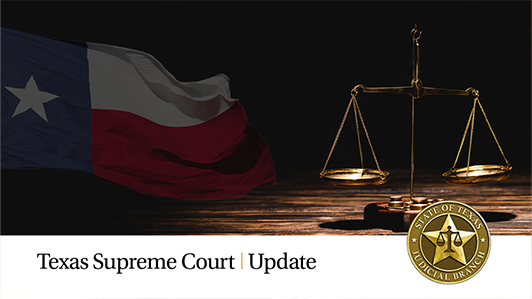The following are summaries of selected opinions issued by the Texas Supreme Court in September 2024. These summaries are prepared by court staff as a courtesy and are not a substitute for the actual opinions. The summaries are overviews of the opinions; please review the entire opinions.
ADMINISTRATIVE LAW: Administrative Procedure Act
Tex. Dep’t of State Health Servs. v. Kensington Title-Nev., LLC, ___ S.W.3d ___, 2023 WL 4373384 (Tex. App.—Austin 2023), pet. granted (Sept. 27, 2024) [23-0644].
The Administrative Procedure Act waives sovereign immunity in a suit seeking a declaration about an administrative rule’s “applicability.” The issue in this case is whether the request for declaratory relief challenges a rule’s application (how the rule applies) as opposed to its applicability (whether the rule applies).
Kensington Title-Nevada, LLC acquired real property on which the occupant had abandoned stored radioactive waste. Kensington initiated decommissioning activities but stopped before completion. The Texas Department of State Health Services then fined Kensington for possessing the material without a license and for failing to decommission in a timely manner. Kensington challenged the fine through a formal administrative hearing. Concurrently, Kensington sued the Department requesting a declaration that the administrative rule could not be applied to force a real property owner like Kensington to accept liability for radioactive materials abandoned on its property. The Department filed a plea to the jurisdiction arguing that Kensington failed to invoke the APA’s immunity waiver because it only seeks a determination about the rule’s application, not its applicability. The trial court denied the Department’s plea, but the court of appeals reversed and dismissed for want of subject-matter jurisdiction. On petition for review, Kensington contends that the appeals court’s failure to apply the immunity waiver rests on an improper rewriting of the request for declaratory relief. The Department’s response argues that dismissal was proper because (1) the court’s analysis was correct; and (2) Kensington lacks standing for want of a redressable injury. As to the latter, the Department asserts that the administrative action was based on Kensington’s exercise of dominion and control over the regulated materials, not ownership of real property.
The Court granted the petition for review.
PROCEDURE—PRETRIAL: Discovery
In re Peters, ___ S.W.3d ___, 2024 WL ___ (Tex. Oct. 4, 2024) (per curiam) [23-0611].
This case involves the application of the Fifth Amendment privilege against self-incrimination to discovery requests.
After drinking, Taylor Peters caused a multi-car crash that injured the plaintiffs. Peters was admitted to a hospital, where he told the responding police officer that he had visited two bars whose names he had forgotten, drank three beers, and remembered feeling “buzzed.” The officer noted that Peters appeared confused and disoriented. A breathalyzer test revealed that Peters had a blood-alcohol concentration above the legal limit. He was arrested and charged with intoxication assault with a motor vehicle.
After suing Peters for negligence, the plaintiffs served interrogatories inquiring where Peters had been before the crash. They sought the names of the bars that served Peters alcohol in order to initiate a timely dram shop action. Peters invoked the Fifth Amendment and refused to provide the information. The trial court granted the plaintiffs’ motion to compel. The court of appeals denied Peters’ mandamus petition.
The Supreme Court conditionally granted mandamus relief. The constitutional privilege against self-incrimination applies in civil litigation and can bar discovery, no matter how critical the need for that discovery is. Here, Peters’ discovery responses could be used against him in the criminal case by leading to evidence that Peters drank more than the three beers that he claimed. The Court rejected the plaintiffs’ argument that Peters waived the privilege by disclosing to the police that he had visited two bars, drank three beers, and felt buzzed. The plaintiffs did not show a voluntary, knowing, and intelligent waiver of the privilege in the record; indeed, the officer’s notes about Peters’ condition cut against a voluntary waiver.

